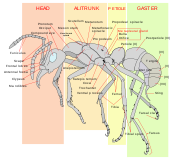
Metapleural gland
Encyclopedia

Ant
Ants are social insects of the family Formicidae and, along with the related wasps and bees, belong to the order Hymenoptera. Ants evolved from wasp-like ancestors in the mid-Cretaceous period between 110 and 130 million years ago and diversified after the rise of flowering plants. More than...
s and basal in the evolutionary history of ants. They are responsible for the production of an antibiotic
Antibiotic
An antibacterial is a compound or substance that kills or slows down the growth of bacteria.The term is often used synonymously with the term antibiotic; today, however, with increased knowledge of the causative agents of various infectious diseases, antibiotic has come to denote a broader range of...
fluid that then collects in in a reservoir on the posterior of the ant's alitrunk. These reservoirs are also referred to as the bulla and vary in size between ant species and also between castes of the same species.
From the bulla, ants can groom the secretion onto the surface of their exoskeleton
Exoskeleton
An exoskeleton is the external skeleton that supports and protects an animal's body, in contrast to the internal skeleton of, for example, a human. In popular usage, some of the larger kinds of exoskeletons are known as "shells". Examples of exoskeleton animals include insects such as grasshoppers...
. This helps to prevent the growth of bacteria
Bacteria
Bacteria are a large domain of prokaryotic microorganisms. Typically a few micrometres in length, bacteria have a wide range of shapes, ranging from spheres to rods and spirals...
and fungal spores
Fungus
A fungus is a member of a large group of eukaryotic organisms that includes microorganisms such as yeasts and molds , as well as the more familiar mushrooms. These organisms are classified as a kingdom, Fungi, which is separate from plants, animals, and bacteria...
on the ants and inside their nest.
Though considered an important component in an ants immunity
Immunity
-Medicine:* Immunity , resistance of an organism to infection or disease.* Immunity , a scientific journal published by Cell Press-Law:*Amnesty law, immunity from past crimes...
against parasites, some ant species have lost the gland during their evolution. These losses correlate with ants that have a 'weaving' lifestyle, such as ants in the genus Oecophylla, Camponotus and Polyrhachis
Polyrhachis
Polyrhachis is a genus of formicine ants found in the Old World with a large number of species . The genus is yet to be comprehensively resolved and contains many varied species including nest weavers , swimming workers , soil and tree dwellers Polyrhachis is a genus of formicine ants found in the...
. It was originally suggested that because this weaving lifestyle also tended to involve an arboreal lifestyle that the parasite pressure above ground was not as great as for terrestrial ants, resulting in a reduced selective pressure to keep this antibiotic gland. Recent work suggests instead that these ants may just utilise other antiparasite defences such as increased grooming and venom.
Most male ants are not known to have metapleural glands. Its believed they benefit from the shared secretions of other ant workers and do not need any themselves. Additionally, slave-making ants do not have metapleural glands though the slave species they use do and it is these ants that groom the slavemakers and their brood.

